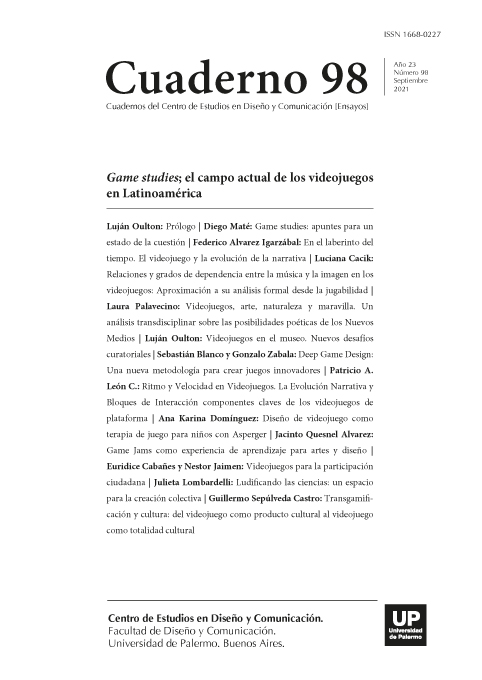Ludificando las ciencias: un espacio para la creación colectiva
Resumo
Este artigo discute a criação coletiva de um relacionamento triplo: gamification, jogo e jogo de vídeo, em conexão com as ciências, particularmente a Ciência Cidadã. O termo Ciência Cidadã responde ao desenvolvimento de estudos científicos realizados cidadãos não qualificados, em colaboração com cientistas ou instituições científicas. Existem inúmeros exemplos de projetos de pesquisa em Ciências Cidadãs que foram ludificados ou desenvolveram jogos completos. A partir desta abordagem, jogos de vídeo e gamification manifestar como uma engrenagem para incorporar novos conhecimentos, mas também para criar e desenvolver a investigação coletiva.
Referências
Aarseth, E. (2011). “Define Real, Moron!”-Some Remarks on Game Ontologies. En Digarec Keynote-lectures 2009/10 (pp. 50-68). Universität Potsdam.
Argüello Ospina, C. (2010). El juego como práctica de la libertad: La imposición y la construcción de reglas. Voces y silencios. Revista Latinoamericana de Educación, 1(2), 141-157.
Arza, V., Fressoli, M., Arancibia, F., Arancio, J., del Castillo, M., López, E., … Vasen, F. (2016). Proyecto: Ciencia abierta en Argentina: experiencias actuales y propuestas para impulsar procesos de apertura.
Bally, G., & Reuter, J. (1958). El juego como expresión de libertad. Fondo de Cultura Económica.
Bonney, R., Ballard, H., Jordan, R., McCallie, E., Phillips, T., Shirk, J., & Wilderman, C. C. (2009). Public Participation in Scientific Research: Defining the Field and Assessing Its Potential for Informal Science Education. A CAISE Inquiry Group Report. Online Submission.
Bowser, A., Hansen, D., He, Y., Boston, C., Reid, M., Gunnell, L., & Preece, J. (2013). Using Gamification to Inspire New Citizen Science Volunteers. En Proceedings of the First International Conference on Gameful Design, Research, and Applications (pp. 18–25). New York, NY, USA: ACM. https://doi.org/10.1145/2583008.2583011
Competition - igem.org. (s. f.). Recuperado 20 de diciembre de 2018, de http://igem.org/
Competition Deterding, S., Dixon, D., Khaled, R., & Nacke, L. (2011). From Game Design Elements to Gamefulness: Defining «Gamification». En Proceedings of the 15th International Academic MindTrek Conference: Envisioning Future Media Environments (pp. 9–15). New York, NY, USA: ACM. https://doi.org/10.1145/2181037.2181040
Djaouti, D., Alvarez, J., Jessel, J.-P., & Rampnoux, O. (2011). Origins of serious games. En Serious games and edutainment applications (pp. 25-43). Springer.
Early history of video games. (2018). En Wikipedia. Recuperado de https://en.wikipedia.org/w/index.php?title=Early_history_of_video_games&oldid=873745916
Eveleigh, A., Jennett, C., Lynn, S., & Cox, A. L. (2013). “I Want to Be a Captain! I Want to Be a Captain!”: Gamification in the Old Weather Citizen Science Project. En Proceedings of the First International Conference on Gameful Design, Research, and Applications (pp. 79–82). New York, NY, USA: ACM. https://doi.org/10.1145/2583008.2583019
Games, S. : C. S. (s. f.). Quantum Moves | ScienceAtHome. Recuperado 30 de diciembre de 2018, de https://www.scienceathome.org/games/quantum-moves/
Huizinga, J. (2000). Homo ludens. Alianza. Recuperado de https://books.google.com.ar/ books?id=QQ_OwAEACAAJ
Iacovides, I., Jennett, C., Cornish-Trestrail, C., & Cox, A. L. (2013). Do Games Attract or Sustain Engagement in Citizen Science?: A Study of Volunteer Motivations. En CHI ’13 Extended Abstracts on Human Factors in Computing Systems (pp. 1101–1106). New York, NY, USA: ACM. https://doi.org/10.1145/2468356.2468553
Ihde, D. (2015). Postfenomenología y tecnociencia: conferencias en la universidad de Pekin. Sello Arsgames. In Quantum Gaming, Humans Reign Victorious Over Computers. (2016, abril 13). Recuperado 30 de diciembre de 2018, de https://www.insidescience.org/news/quantum-gaminghumans-reign-victorious-over-computers
Jennett, C., Kloetzer, L., Cox, A. L., Schneider, D., Collins, E., Fritz, M., …
Charalampidis, I. (2017). Creativity in Citizen Cyberscience. Human Computation, 3(1), 181-204.
Juul, J. (2008). The magic circle and the puzzle piece. Kapp, K. M. (2012). The Gamification of Learning and Instruction: Game-based Methods and Strategies for Training and Education.
John Wiley & Sons. Karhulahti, V.-M. (2012). Double fine adventure and the double hermeneutic videogame. En Proceedings of the 4th International Conference on Fun and Games (pp. 19-26). ACM.
Landers, R. N., Auer, E. M., Collmus, A. B., & Armstrong, M. B. (2018). Gamification science, its history and future: Definitions and a research agenda. Simulation & Gaming, 1046878118774385.
Michael, D. R., & Chen, S. L. (2005). Serious games: Games that educate, train, and inform. Muska & Lipman/Premier-Trade. Old Weather. (s. f.). Recuperado 21 de diciembre de 2018, de https://www.oldweather.org/ Play | EyeWire. (s. f.). Recuperado 27 de febrero de 2019, de https://eyewire.org/ RAE. (2015, junio 10). @jc_saap #RAEconsultas Resulta preferible en español el uso de «ludificación», voz formada con la raíz latina «ludus» «juego»,... [Tweet]. Recuperado 19 de abril de 2018, de https://twitter.com/raeinforma/status/608553545403629568?lang=es
Sørensen, J. J. W., Pedersen, M. K., Munch, M., Haikka, P., Jensen, J. H., Planke, T., Lieberoth, A. (2016). Exploring the quantum speed limit with computer games. Nature, 532(7598), 210.
Sternberg, R. J. (2006). The Nature of Creativity. Creativity Research Journal, 18(1), 87-98. https://doi.org/10.1207/s15326934crj1801_10
Tinati, R., Luczak-Roesch, M., Simperl, E., & Hall, W. (2017). An investigation of player motivations in Eyewire, a gamified citizen science project. Computers in Human Behavior, 73, 527-540. https://doi.org/10.1016/j.chb.2016.12.074
Los autores/as que publiquen en esta revista ceden los derechos de autor y de publicación a "Cuadernos del Centro de Estudios de Diseño y Comunicación", Aceptando el registro de su trabajo bajo una licencia de atribución de Creative Commons, que permite a terceros utilizar lo publicado siempre que de el crédito pertinente a los autores y a esta revista.


